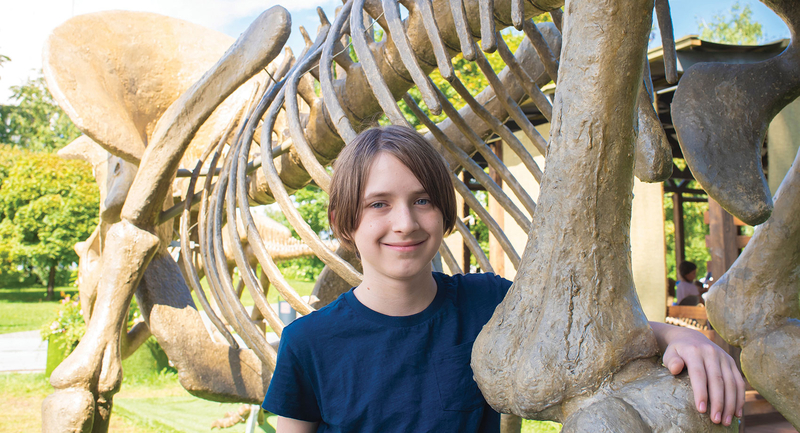Editor's Note: We are pleased to introduce our new columnist Bryan Goodwin, who will alternate with Jane David in writing the "Research Says…" column. Bryan is vice president of communications for McREL, a nonprofit organization providing research-based products and services for K–16 education. Before joining McREL, he was a journalist, high school teacher, and college instructor. He has written a wide variety of McREL research reports, including McREL's most recent publication, Changing the Odds for Student Success: What Matters Most.
Recently, my daughter engaged in a rite of passage at her school—the America Fair. For weeks, her project on her chosen topic, the Great Depression, consumed her life (and our dining room table) as she researched, wrote a report, and prepared a museum-style diorama to present at an open house.
Students in schools everywhere participate in similar events every year. Given the tremendous effort such projects require of students and teachers (and parents), it's worth asking, What is their real value?
Examining the Research
One premise underlying the use of student projects is that if we allow students to choose what to study, they will be more motivated to learn. A second premise is that students will learn more by doing projects than they will with traditional methods, such as classroom lectures. Let's look at what research says about both assumptions.
Choice: Can You Have Too Much?
A 2008 meta-analysis of 41 studies found a strong link between giving students choices and their intrinsic motivation for doing a task, their overall performance on the task, and their willingness to accept challenging tasks (Patall, Cooper, & Robinson, 2008). However, the researchers also found diminishing returns when students had too many choices: Giving more than five options produced less benefit than offering just three to five. The researchers concluded that with student choice, "too much of a good thing may not be very good at all" (p. 298).
In a now-famous experiment, researchers Sheena Iyengar and Mark Lepper (2000) gave two groups of college students a weekend assignment to write a two-page essay for extra credit. The first group was given the choice of 6 possible essay topics; the second was given 30 choices. The counterintuitive result of the experiment? The students who were given fewer choices were more likely to turn in the assignment, and they also wrote better essays.
Iyengar and Lepper concluded that having too many options may have caused students in the second group to simply "end the choice-making ordeal" by choosing a "merely satisfactory" topic for their essay (p. 1,000), which left them dissatisfied with their selection and less motivated to do a good job. In short, giving students too many choices or wide-open project assignments may actually demotivate them by causing too much angst over whether they've chosen the right topic or making them expend all of their mental energy on deciding what to do, rather than on actually doing the project well.
Advice for Educators: Offer Limited Choice
The research suggests that teachers should give students choices, but not too many. John Guthrie, developer of Concept-Oriented Reading Instruction, recommends that teachers offer fewer choices to less experienced students—for example, simply letting them choose between two preselected readings. With more advanced students, teachers can expand the number of choices—for example, asking them to "choose three or four concepts of ecology and locate several animals that can be used to illustrate these concepts" (Guthrie, Wigfield, & Perencevich, 2004, p. 64). According to Guthrie, the transition from fewer to more choices should be gradual, sometimes spanning several months.
A meta-analysis of 35 studies of inquiry-based science strategies (for example, posing problems and asking students to conduct scientific experiments to resolve them) reported only modest gains in student achievement compared with conventional methods. However, the results indicated much larger gains in students' critical-thinking skills (Smith, 1996); this appears to be the area in which project-based learning yields the greatest benefits.
Another study—an examination of a middle school history course that combined direct instruction with project-based learning (having students create a short historical documentary)—found that students gained more content knowledge in this class than with traditional methods, and they also gained more skill in historical thinking—the ability to interpret historical facts (Ramos & De La Paz, 2009).
Advice for Educators: Remember the Driving Question
A major shortcoming of many student projects is that they tend to become "doing for the sake of doing" (Barron et al., 1998, p. 274). Educators can avoid this phenomenon and realize the potential of projects to promote students' critical-thinking skills by framing projects around a driving question.
A study by Barron and colleagues (1998) illustrates how a driving question makes a difference. These researchers examined a model rocket– building project that resulted in little student understanding about what really made rockets work. One student commented that the purpose of the project was simply, "You know, to build them and see how high they will go" (p. 274).
In a revised version of this study, the researchers framed the project around a driving question—a request for rocket designs from the National Aeronautics and Space Administration, which would select the best design for use in other classrooms. Researchers asked students to determine whether the rocket would go higher if it were painted or left unfinished, whether three fins were better than four, and how a rounded or pointed nose would affect the rocket's trajectory. Students who completed the revised assignment demonstrated better knowledge of important content (such as the principles of aerodynamics) as well as the ability to think like scientists.
Educators Take Note
To return to the America Fair at my daughter's school, her classmates created many colorful dioramas that represented a wide array of interests. Some of the students, however, expressed regret that they had chosen a topic that ultimately failed to hold their interest. Others said that after much agonizing, they had simply picked one of the teacher-suggested topics. It seems that they would have preferred to select from a more limited list of topics.
Many of the projects also appeared to focus on recalling facts, such as state populations or the dates of historical events, rather than on critical thinking, such as analyzing the causesof events. Had the assignment been framed around a driving question (for example, What was it like to live in the time of the Renaissance or the Great Depression?), it might have taken better advantage of what project-based learning does best: promote students' critical-thinking skills.
My intent is not to criticize my daughter's school or its outstanding teachers. Rather, the lesson is this: If a time-honored tradition at this excellent school could use some research-based tweaks, it's likely that many other schools could benefit from reexamining their own project-based rites of passage in light of what the research says.








